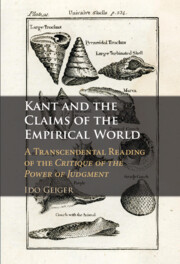 Kant and the Claims of the Empirical World
Kant and the Claims of the Empirical World Published online by Cambridge University Press: 30 April 2022
Chapter 4 contends with the Dialectic of the Teleological Power of Judgment and the discursivity of the understanding. It argues that a discursive understanding must think of the empirical world as ordered by an ideal system of universal concepts, which takes the form of a complete hierarchical taxonomy: from the most general empirical concepts to ever more specific concepts. It argues further that the assumption of a comprehensive hierarchy of concepts determining the sensibly given is Kant’s way of talking about the objective order of nature. Only the complete but unattainable determination of the sensibly given by a complete system of concepts can ground the claims to objectivity made in determinative judgments. Kant ultimately thinks of such a system and its concepts as not merely descriptive but as causally informative and thus explanatory as well. It is a transcendental condition of empirical experience and knowledge, which follows from the fact that we are discursive creatures in pursuit of objective knowledge. An important consequence is that empirical knowledge claims are always revisable and indeed defeasible. A further very important argument shows that the part-to-whole or mechanistic form of physical explanation is also grounded in the discursivity of our understanding.
To save this book to your Kindle, first ensure no-reply@cambridge.org is added to your Approved Personal Document E-mail List under your Personal Document Settings on the Manage Your Content and Devices page of your Amazon account. Then enter the ‘name’ part of your Kindle email address below. Find out more about saving to your Kindle.
Note you can select to save to either the @free.kindle.com or @kindle.com variations. ‘@free.kindle.com’ emails are free but can only be saved to your device when it is connected to wi-fi. ‘@kindle.com’ emails can be delivered even when you are not connected to wi-fi, but note that service fees apply.
Find out more about the Kindle Personal Document Service.
To save content items to your account, please confirm that you agree to abide by our usage policies. If this is the first time you use this feature, you will be asked to authorise Cambridge Core to connect with your account. Find out more about saving content to Dropbox.
To save content items to your account, please confirm that you agree to abide by our usage policies. If this is the first time you use this feature, you will be asked to authorise Cambridge Core to connect with your account. Find out more about saving content to Google Drive.